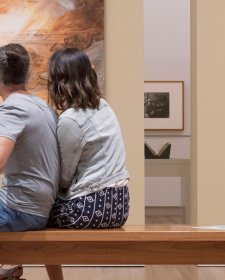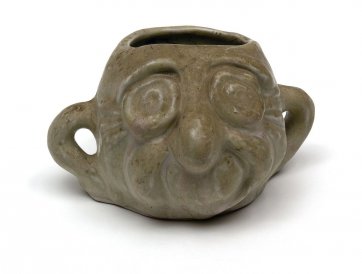Narrator: Leslie Tanner’s Henry Bolte mug is in the long tradition of political caricature. And so is Ron Tandberg, who has been contributing cartoons to The Age since the 1960’s.
Ron Tandberg: A cartoonist has more freedom, because you can interpret the news and actually give it a slant or an interpretation. From my early days, when I always drew on the news, I think it sort of gave me a good background to assess what’s happening, because I was constantly in touch with journalists, and constantly in conferences, and those early days were very important to me because that gave me a feeling of what the real issue was.
Sometimes the ideas come quickly and easily. Other times there’s a lot of torture, and often how you present it is the difference between a good cartoon and a bad cartoon.
Like many other people, I was utterly against the invasion of Iraq. It’s all right for some people to have weapons of mass destruction, but we’re very selective on who’s allowed to have them. And I just felt from many days or weeks I’d thought of that idea, and it was just funny that it … finally it just gelled and came simply. John Howard’s head was a gift, because he had some very basic elements and, you know, you couldn’t get him wrong very much because you had freedom of the glasses, the bald head, and the teeth, and that smile of sincerity.
I think a good cartoonist actually comes from a very freer situation than the traditional education. I think my education was pretty ordinary, and I think it helped because you actually … you didn’t have a structured way of looking at things. You actually had your own little way of looking at things, and I think that’s what a cartoonist has to have, a very individual view and individual experiences.
Related information



The Gallery
Visit us, learn with us, support us or work with us! Here’s a range of information about planning your visit, our history and more!



Support your Portrait Gallery
We depend on your support to keep creating our programs, exhibitions, publications and building the amazing portrait collection!



Plan your visit
Information on location, accessibility and amenities.





